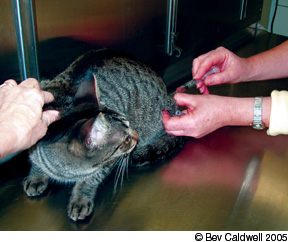Could a law-abiding pet owner be harboring a feline felon? There was once a law in New Jersey that required roaming cats to wear three bells on their collars to warn birds of their eager arrival. Although varying greatly from community to community, todays laws mainly cover licenses and vaccines, but skyrocketing homeless cat numbers (estimated at 70 million in the U.S.) are inciting new laws that can quickly land you and your cat in trouble.

288
Licenses/Vaccines/Spaying
In some communities, licenses and rabies vaccines are required after your cat reaches a certain age, usually three to six months. For recently acquired adult cats, most towns allow a set time (around 30 to 60 days) to secure the required documentation. Fees vary and are reasonable – around $5 to $15 a year with some areas imposing hefty surcharges (close to $100) for non-neutered pets. A cat is usually required to sport proof of licensing and vaccination via a collar and tag or a tattoo.
These categories of laws generally cover all cats – even those kept exclusively indoors.
If you have an unvaccinated indoor pet that resists doctor visits, house calls might be something to think about since most cats do much better if they havent had the time to get all worked up about a trip to the veterinarians office, suggests Terri Curtis, DVM of the University of Florida.
Scofflaw owners may be cited for violations and their kitties impounded. Some towns impose fines as high as $500 for unvaccinated pets, and cats caught without a license tag or tattoo can cost their owners upwards of $50.
And forget about a feast of felines in some communities, where households are limited to three to six cats. Owning multiple kitties (unless you have a hobby breeders permit) often requires a permit and proof of vaccination and spaying. Pet combination limits (e.g. three cats and two dogs) can further dictate your cat allotment.
Bites and Scratches
If Kitty attacks a tormenting toddler, some localities require that the animal be quarantined for 10 days even if her vaccinations are current. You may be permitted to home-quarantine your pet, but if not you must cover her extended vacation along with a small redemption fee. Quarantine violations can run upwards of $500.
You may be wholly liable for Kittys destruction or simply open to a lawsuit from a niggling neighbor. In one town, a judge ordered a hapless owner to replace a Cadillacs claw-torn vinyl roof. Many townships require you to refresh a friends flower bed or the neighborhood sandbox after Fluffy has soiled it.
Expecting your pet to give up her natural behaviors is unrealistic, according to Dr. Curtis. She suggests you provide your pet with items she can legally scratch and appropriate places to eliminate in to sidestep tangles with the law. Needless to say, keeping Fluffy indoors is the best solution.
Trespassing Tabby
Trespass laws require cats to be under the physical control of their owners via a fence, a leash or other restraint. Some towns restrict only non-neutered felines or those in heat, but others make no such exceptions. Local citizens are often free to trap any uninvited cats found roaming their property and whisk them off to the animal shelter.
After leash laws are passed, some towns conduct sweeps where felines without a leash are captured and taken to a holding facility. Unclaimed cats may be euthanized.
Dr. Curtis understands the challenges owners face with trespass laws. Without some sort of barrier, it can be very difficult to keep a cat confined. What I recommend are the cat fences that attach to existing chain-link or wooden fences. For more information on enclosures, you can visit these sites: www.catfencein.com/, www.purrfectfence.com/ or www.cdpets.com/.



